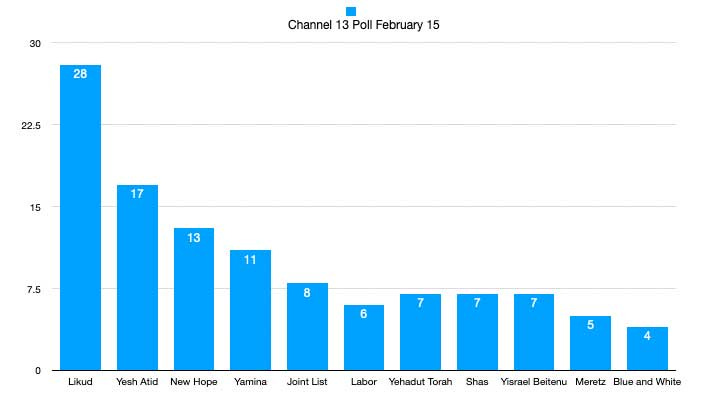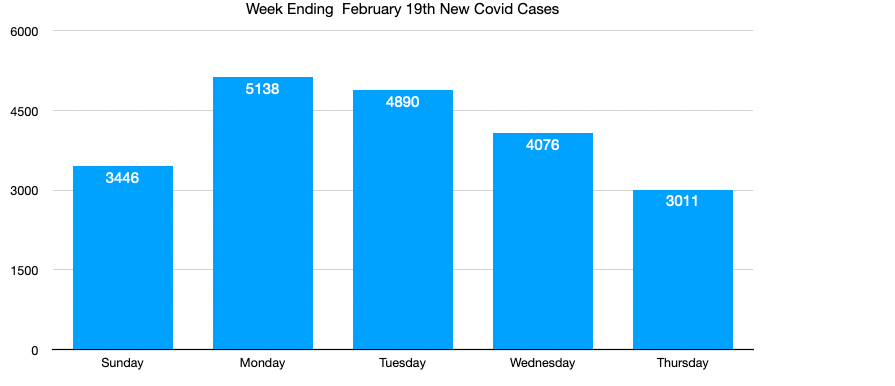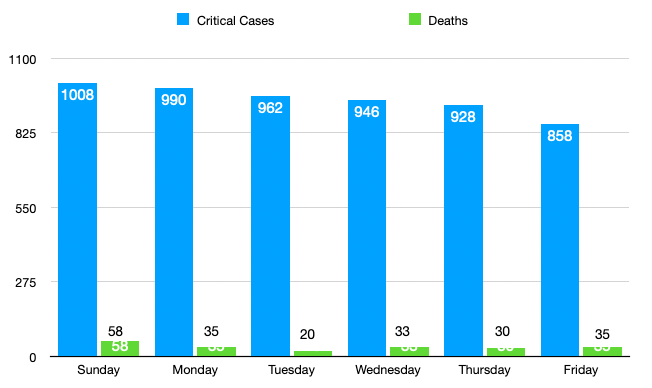POLITICS
It's amazing that with less than five weeks left before the upcoming election, there is almost nothing new to write about regarding this race. Prime Minister Netanyahu continues to make use of his incumbent status to stay very much in the news. Netanyahu even gave a rare prime-time interview to Channel 12 News, the most-watched news in the country. By all accounts, he gave a strong interview — though the fact that a fair number of the things he said were outright lies was missed by most viewers. One of the most egregious falsehoods was his statement that Israel has a current budget in place when in reality, no budget has been passed since 2018.
The latest poll from Channel 13 (seen below) shows a reasonably stagnant race, with Netanyahu unable to form a government of 61. However, two significant caveats need to be added. First, this election will come down to which parties pass the election threshold and which do not. In some cases, a few thousand votes may determine that outcome. Second, and most importantly, I cannot take any of these polls seriously. The only number that remains pretty solid is the percent of Likud support, which will probably not change much. However, I do not know one person who has definitively decided which party will receive their vote; almost all have not made up their mind at all. There is a certain level of tautology in the current situation since many people plan to vote based on how the various parties fare in
the polls. The bottom line is that none of the opposition leaders has managed to generate even a shred of enthusiasm.
COVID–19
This week the news in Israel on the Covid front was finally fairly positive. The rate of new cases continues to fall, as the impact of vaccinations seems to be felt. The number of new infections has fallen to an average of 4,000 a day, with the positivity rate hovering around 6%. The number of severe hospital cases has fallen to 928, a drop of 100 in the week. With most Israelis over 60-years-old having reached the point of two doses, plus one week, the overwhelming number of new cases is now among younger people. Several studies released this week all show an approximately 90% effective rate for the Pfizer vaccine's ability to block transmission of COVID-19, and a 94% success rate at blocking severe disease, or death. This number matches the results of the much smaller Pfizer trial. A new study from Sheba Hospital, published this morning in the prestigious Lancet Journal, stated that two weeks after the first Pfizer shot recipients show a 75% drop in Coronavirus infections and an 85% drop in developing symptoms for the disease. The one concern is another recent study that indicates Pfizer’s vaccine is less effective against the South African strain of the virus — but how much less effective remains unknown.
Israel continues to vaccinate rapidly, with over 4,225,000 first doses received and 2,500,000 citizens who received both. Israel continues to vaccinate more and more residents, with an average of 150,000 doses being administered daily. Tel Aviv has gone so far as to sponsor vaccination drives outside bars; while Bnei Brak has been giving out Cholent with a vaccine. Israel announced it will begin vaccinating all of the Palestinians who work in Israel in the coming weeks.
The high percentage of vaccinated, combined with the relative drop in new cases of infection has pushed the government to relax most commerce restrictions. As of Sunday, malls and stores will be open to everyone, in limited numbers; while swimming pools, gyms, and hotels will only be available to those who have been vaccinated. The propriety of drawing a distinction between the vaccinated and unvaccinated continues to spark broad discussion. Most Israeli health experts believe the country will be taking a large risk by opening up the economy so widely while our numbers are still so high. Yesterday’s positive rate was 6.2% on those tested. If elections were not looming, the government would likely be more cautious.
The question of what to do about those who do not want to become vaccinated is a major source of debate. Forcing people to get vaccinated has been ruled out. However, the question of whether or not services can be denied to the unvaccinated has become an issue of significant contention. Some claim any attempt to limit access of the unvaccinated would create two classes of citizens — i.e. if those who have not been vaccinated are discriminated against, that in and of itself would be a form of coercing people to get vaccinated against their wills. On the other hand, at the moment, since those under 16 cannot yet be vaccinated, the only chance of ending the pandemic is to vaccinate nearly everybody over age 16. The rights of an individual and the rights of the collective are at odds in this case, and Israel will have to navigate these complex issues in the coming months.
BIDEN CALLS TRUMP
On Wednesday night, President Biden called Prime Minister Netanyahu. The call came a month into Biden's Presidency, and the delay of this initial conversation triggered a great deal of speculation in Israel. Was Biden seeking a little revenge against Netanyahu for his close support for Republicans or for Netanyahu's failure to reach out to Biden when he visited America last year?
Perhaps the hold-up was simply the low priority Biden currently attributes to the Middle East, as he focuses on domestic affairs and rebuilds American ties to Europe and Asia. Whatever the reason, one item discussed on the call has become urgent — i.e. What to do about Iran’s nuclear program, and whether or not the US should rejoin the current agreement.
See a preview of my more extensive article that will be in Newsweek.
YOUNG HAREDI WOMAN RETURNS FROM SYRIA
The strange report of a young Haredi woman who made her way into Syria has led some of the news this week. The story itself appears to be a case of a disturbed woman who first tried to enter Gaza, and when that attempt failed, she went to Syria. The young woman was brought back to Israel in return for two Syrian shepherds who had crossed into Israel. The stranger part of this ordeal was that the matter was handled in an emergency cabinet meeting, in which censorship was invoked, coupled with a high level of involvement on the part of Netanyahu, Gantz, Ashkenazi, and others, to get the Russians to intercede to accomplish the release. It would seem these releases could have been achieved with the aid of officials at a much lower level.
DEFENSE
According to reports, this was another week punctuated by another set of Israeli strikes at Iranian targets in Syria. Meanwhile, the Ministry of Defense announced that Israel Aircraft, together with the US Missile Defense Department, has begun to work at developing the 4th generation of Arrow intercept missiles. The Arrow missile, Israel's first line of defense against ballistic missile attacks, will become even more capable once the development of version 4 is completed.
BUSINESS
One of the clear beneficiaries of COVID-19 has been Wix, the Tel Aviv-based company that makes it easy to create a website. Wix has seen sales soar, along with its shares, whose value now gives the company a market cap of $18.5 billion. Bank of Israel has kept interest rates unchanged, for the seventh straight time. The bank indicated it was optimistic that economic growth would resume in the coming months, as the impact of widespread COVID-19 vaccinations will be felt. According to the Central Bureau of Statistics, Israel’s GDP dropped 2.5% in 2020. What is not reflected is a large drop in personal consumption.






